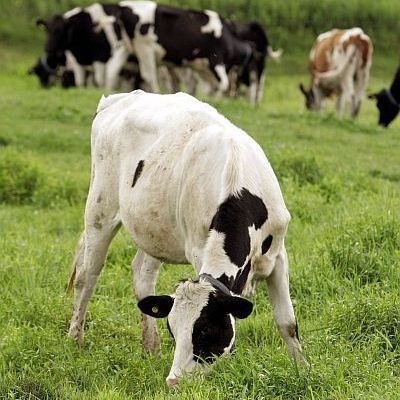
(Host) At the end of this year, H.P. Hood will stop buying milk from organic dairy farms
The decision comes at a time when demand for organic milk is down, and will affect dozens of farms in Vermont, Maine, New York and New Hampshire.
VPR’s Susan Keese has more.
(Keese) A few years ago, the market for organic milk was growing by 20 percent annually.
A lot of dairy farms transitioned to organic to take advantage of that demand and the higher premiums USDA certified organic dairies enjoy. The transition typically takes three years and can be costly.
Conventional milk processor H.P. Hood jumped into the market too. The company signed on to provide fluid milk for Stonyfield Farm, the New Hampshire-based organic company.
Ed Maltby is executive director of the Northeast Organic Dairy Producers Alliance.
(Maltby) "They came in at a late stage in the development of organics and I think probably came in too late to get well-established before we had the downturn in the market earlier this year."
(Keese) Maltby says the economic downturn hurt organic milk sales. A gallon of organic costs twice as much as a gallon of conventional milk.
The drop in sales created a surplus of organic milk. H.P. Hood responded by terminating contracts with some farms, leaving them with no organic buyer for their milk.
Now another company, is taking over the Stonyfield Farms fluid organic milk contract from Hood.
That company is Organic Valley. It’s the dairy label for Cropp, the nation’s largest organic farmer-owned cooperative.
John Cleary is the company’s New England Coordinator.
(Cleary) "H.P. Hood has decided to focus primarily on their core business of processing and distributing dairy product and they asked if Organic Valley could step in and take on the managing of this particular group of farmers and the milk supply."
(Keese) The coop already provides milk for Stonyfield’s organic yogurt brand.
It has about 125 farmer-members in Vermont. And Cleary says they’ve felt the sting of the organic surplus too.
Rather than sacrifice their locked-in higher price, over twice what conventional farmers make, co-op members agreed last year to cut back their production to even out the supply.
Still, the farmers in the Organic Valley Coop agreed to take in the H-P Hood Producers. Randolph farmer Brent Beidler is a coop member.
(Beidler) "The thing that motivated all of us was not wanting to see any more farmers lose their markets, and that’s where they were headed."
(Keese) Cleary of Organic Valley says the coop works hard to balance milk supply and demand. In order not to lose that balance for its own farmers, the coop will have a special contract for the former H.P. Hood providers.
(Cleary) "And the way that balance is being achieved is those new farmers are being paid based on how much of their milk is being utilized as organic. So the oversupply from that particular group of farmers that has to be sold on the conventional market will come out of the pay price for that group of farmers."
(Keese) Cleary says he’s confident the coop will find a way to integrate the new members fully when the demand for organic milk rebounds.
For VPR News, I’m Susan Keese.